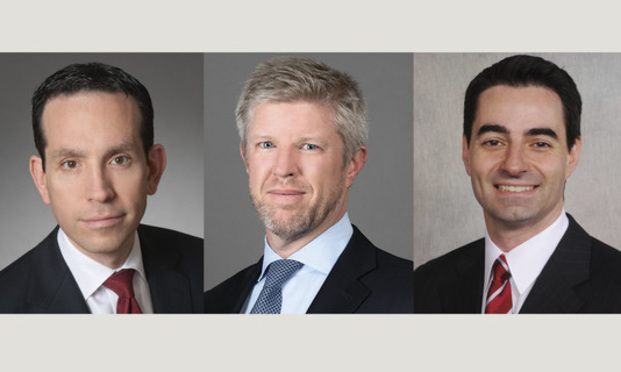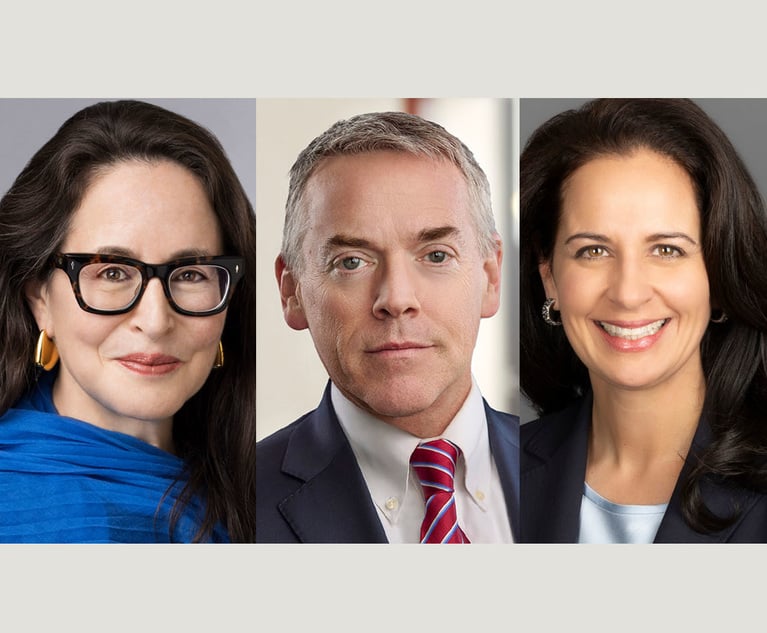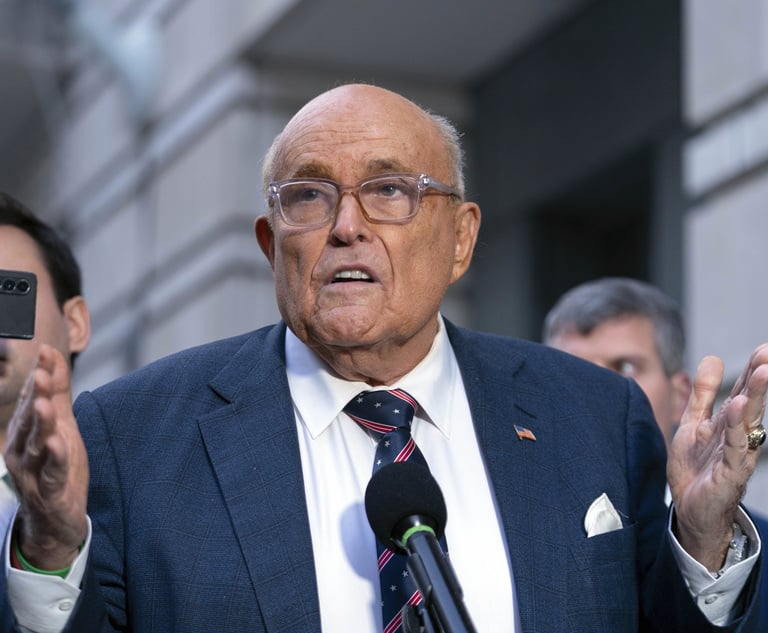Litigators of the Week: Kirkland Team Soars with $125M Win for EagleView
Kirkland & Ellis partners Adam Alper, Mike De Vries and Gianni Cutri scored a $125 million jury verdict and TRO for their industry-disrupting client.
October 11, 2019 at 12:01 AM
8 minute read
 (l-r) Adam Alper, Mike De Vries, and Gianni Cutri, with Kirkland & Ellis.
(l-r) Adam Alper, Mike De Vries, and Gianni Cutri, with Kirkland & Ellis.
Our Litigators of the Week are Kirkland & Ellis partners Adam Alper, Mike De Vries and Gianni Cutri, who scored a $125 million jury verdict in a patent infringement case in U.S. District Court for the District of New Jersey.
They represent aerial imagery experts EagleView Technologies, an innovative newcomer that had its technology stolen by larger competitors. Not only did the Kirkland team win full damages for willful infringement of five patents, they also scored a rare TRO broadly enjoining defendants Xactware Solutions and Verisk Analytics from further infringing conduct.
They discussed the case with Lit Daily.
Lit Daily: Who is your client and what was at stake?
Adam Alper: Our client is EagleView, a small company which developed key technology that revolutionized a $30 billion industry.
Contractors and insurers require dimension information about roofs of homes and other buildings in order to generate repair estimates, such as after catastrophic events like hurricanes, or when there is other damage. EagleView invented innovative ways to provide that information, without having to climb up on roofs to take hand measurements.
The defendants saw EagleView's technology, thought it was a breakthrough, and then tried to take it from EagleView and put EagleView out of business.
We limit our Litigator of the Week award to a maximum of three lawyers—but who beyond Adam, Mike and Gianni played lead roles?
Adam Alper: Partner Brandon Brown adeptly presented complex technical information when putting on our technical expert, and shone a clear light on defendants' willful infringement in crossing their primary technical fact witness. And Partner Pat Carson was masterful in presenting our damages case to the jury in a clear, common sense way when putting on our damages expert.
Tell us about the underlying patents—why are they worth fighting over?
Adam Alper: The patents relate to numerous specific technologies surrounding the use of aerial images for generating information concerning the physical structure of roofs, which is provided in roof reports. We showed the jury how the patented technologies completely changed the way contractors and insurers assess damage to roofs and were widely revered as game-changers in the industry.
Mike De Vries: EagleView took a stand because it was the rightful owner of this technology and the defendants were willfully infringing on those rights. We showed the jury how the defendants had a calculated plan to steal EagleView's customers and use EagleView's technology against it to run them out of the business.
The defendants twice tried to buy EagleView for hundreds of millions of dollars. When that didn't work, what happened next?
Gianni Cutri: Leading up to the time that the defendants tried to buy EagleView's business for $650M, they had publicly proclaimed that one of the "special things" about EagleView was its patented technology; that EagleView's technology was "innovative;" and that defendants needed it for themselves.
When the defendants couldn't buy EagleView's technology, they simply took it, developed a copycat product and launched a plan to aggressively erode EagleView's market share.
When and how did you become involved in the case?
Mike De Vries: We have been involved from the very beginning of the case when it was filed in 2015, representing EagleView in all aspects of the proceedings, including throughout the litigation and trial, as well as in connection with defendants' failed IPR attempts to invalidate the patents.
Who was opposing counsel?
Gianni Cutri: Lee Bromberg and Scott Christie of McCarter & English were lead counsel for the defendants at trial. Mark Perry from Gibson Dunn has since joined the team.
What individual strengths did the members of your team bring to the representation?
Adam Alper: This is a team that has worked together many times over the years on complex, challenging cases. At this point, we have a good sense for what a case needs and everyone leverages their strengths to get the job done.
Mike was able to distill complex topics down into understandable themes for the jury in putting on our lead-off witness (the inventor) and crossing defendants' damages expert to conclude the evidence portion of the case.
Gianni was able to help tell the client's story at trial in a compelling way and he also brought to bear a deep understanding of the defendants' documents and testimony to undermine their claims on the stand that EagleView's technology was worthless and well-known.
Mike De Vries: From the beginning to the end of the case, Adam was outstanding in presenting our client's story to the jury. His closing argument convincingly demonstrated how the evidence he had previewed in the opening statement supported our client throughout the trial. At every stage, he was able to help the jury understand that what the defendants were doing simply wasn't right and that the evidence pointed in only one direction. He crossed the defendants' expert and repeatedly elicited key admissions undermining his opinions about the validity of EagleView's patents.
Gianni Cutri: Adam's closing argument was incredible. It took the devastating statements of the defendants' witnesses, the statements in their own documents and the overwhelming evidence of infringement and helped the jury understand what we had believed all along: that the defendants were unrepentant willful infringers of EagleView's technology.
In David-and-Goliath fights, Kirkland more often is on the side of Goliath. But here, you represented the underdog. How did that dynamic shape your approach to litigating the case?
Gianni Cutri: Defendants put on an aggressive defense throughout the case, including multiple attempts to stay the litigation, filing nine unsuccessful IPR challenges to the validity of Eagleview's five patents-in-suit, and numerous dispositive motions, among many other things. We preserved through to trial and ultimately a verdict.
Trial began on Sept. 9 in New Jersey federal court. What were your primary themes?
Adam Alper: First, EagleView developed and patented revolutionary technologies that a $30 billion industry repeatedly praised as groundbreaking and innovative.
Second, the defendants saw EagleView's technology, thought it was a breakthrough, decided they needed it, and then repeatedly tried to take it away from EagleView, by copying it, unsuccessfully attempting to buy EagleView, and later asking the Patent Office to take EagleView's patents away in nine IPR petitions.
Third, we proved that defendants did all of this knowing that it was infringing on EagleView's patent rights. We explained that was not the right thing for a big company to do, and the jury agreed.
Tell us about a high—and a low—point during the trial.
De Vries: An obvious high point would be when the jury came back and sided with us on every issue and awarded the full damages we requested. As a trial lawyer, you really live for those moments and it was great to deliver that kind of result for the good guys.
In terms of a low point, the trial went on for longer than it needed to, with the defendants dragging out the presentation of their case, but in the end the jury quickly reached their decision in our client's favor.
The jury awarded EagleView $125 million in damages—$800,000 more than you asked for. What did you make of that?
Gianni Cutri: We are obviously gratified by the jury's findings in our favor on all of the issues. The evidence of the damage to EagleView was very strong and supports that number.
The judge went on to issue a rare temporary restraining order ceasing business for defendants Xactware and Verisk. What does this signal—and what happens next?
De Vries: We explained to the court that in the very near term, the defendants planned to continue taking EagleView's customers and undercutting them on price. Our view was that given the strength of the case and the jury's verdict in our favor on every issue, this harm needed to be stopped immediately.
We're gratified that the court entered the TRO and stopped the defendants from trying to put EagleView out of business. The court has continued the TRO until October 18, 2019 and we have already briefed a permanent injunction. We will also be briefing our request to enhance the jury's verdict as well as our request for fees and pre-judgment interest in the coming weeks.
This content has been archived. It is available through our partners, LexisNexis® and Bloomberg Law.
To view this content, please continue to their sites.
Not a Lexis Subscriber?
Subscribe Now
Not a Bloomberg Law Subscriber?
Subscribe Now
NOT FOR REPRINT
© 2025 ALM Global, LLC, All Rights Reserved. Request academic re-use from www.copyright.com. All other uses, submit a request to [email protected]. For more information visit Asset & Logo Licensing.
You Might Like
View All
A Second Straight Year of Increased Securities Filings—With Perhaps More on the Horizon

Firms Come Out of the Gate With High-Profile Litigation Hires in 2025

Some Thoughts on What It Takes to Connect With Millennial Jurors
Trending Stories
- 1Two More Victims Alleged in New Sean Combs Sex Trafficking Indictment
- 2Jackson Lewis Leaders Discuss Firms Innovator Efforts, From Prompt-a-Thons to Gen AI Pilots
- 3Trump's DOJ Files Lawsuit Seeking to Block $14B Tech Merger
- 4'No Retributive Actions,' Kash Patel Pledges if Confirmed to FBI
- 5A Texas Lawyer Just Rose to the Trump Administration
Who Got The Work
J. Brugh Lower of Gibbons has entered an appearance for industrial equipment supplier Devco Corporation in a pending trademark infringement lawsuit. The suit, accusing the defendant of selling knock-off Graco products, was filed Dec. 18 in New Jersey District Court by Rivkin Radler on behalf of Graco Inc. and Graco Minnesota. The case, assigned to U.S. District Judge Zahid N. Quraishi, is 3:24-cv-11294, Graco Inc. et al v. Devco Corporation.
Who Got The Work
Rebecca Maller-Stein and Kent A. Yalowitz of Arnold & Porter Kaye Scholer have entered their appearances for Hanaco Venture Capital and its executives, Lior Prosor and David Frankel, in a pending securities lawsuit. The action, filed on Dec. 24 in New York Southern District Court by Zell, Aron & Co. on behalf of Goldeneye Advisors, accuses the defendants of negligently and fraudulently managing the plaintiff's $1 million investment. The case, assigned to U.S. District Judge Vernon S. Broderick, is 1:24-cv-09918, Goldeneye Advisors, LLC v. Hanaco Venture Capital, Ltd. et al.
Who Got The Work
Attorneys from A&O Shearman has stepped in as defense counsel for Toronto-Dominion Bank and other defendants in a pending securities class action. The suit, filed Dec. 11 in New York Southern District Court by Bleichmar Fonti & Auld, accuses the defendants of concealing the bank's 'pervasive' deficiencies in regards to its compliance with the Bank Secrecy Act and the quality of its anti-money laundering controls. The case, assigned to U.S. District Judge Arun Subramanian, is 1:24-cv-09445, Gonzalez v. The Toronto-Dominion Bank et al.
Who Got The Work
Crown Castle International, a Pennsylvania company providing shared communications infrastructure, has turned to Luke D. Wolf of Gordon Rees Scully Mansukhani to fend off a pending breach-of-contract lawsuit. The court action, filed Nov. 25 in Michigan Eastern District Court by Hooper Hathaway PC on behalf of The Town Residences LLC, accuses Crown Castle of failing to transfer approximately $30,000 in utility payments from T-Mobile in breach of a roof-top lease and assignment agreement. The case, assigned to U.S. District Judge Susan K. Declercq, is 2:24-cv-13131, The Town Residences LLC v. T-Mobile US, Inc. et al.
Who Got The Work
Wilfred P. Coronato and Daniel M. Schwartz of McCarter & English have stepped in as defense counsel to Electrolux Home Products Inc. in a pending product liability lawsuit. The court action, filed Nov. 26 in New York Eastern District Court by Poulos Lopiccolo PC and Nagel Rice LLP on behalf of David Stern, alleges that the defendant's refrigerators’ drawers and shelving repeatedly break and fall apart within months after purchase. The case, assigned to U.S. District Judge Joan M. Azrack, is 2:24-cv-08204, Stern v. Electrolux Home Products, Inc.
Featured Firms
Law Offices of Gary Martin Hays & Associates, P.C.
(470) 294-1674
Law Offices of Mark E. Salomone
(857) 444-6468
Smith & Hassler
(713) 739-1250







